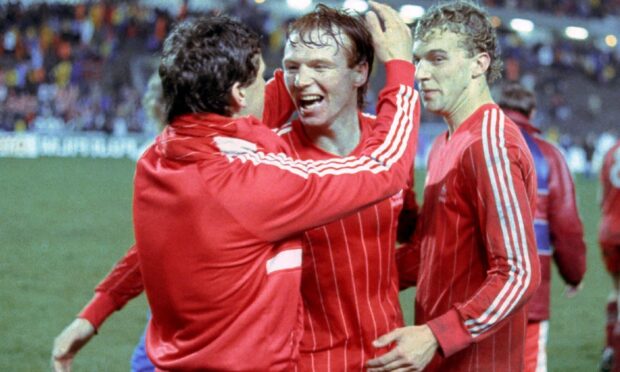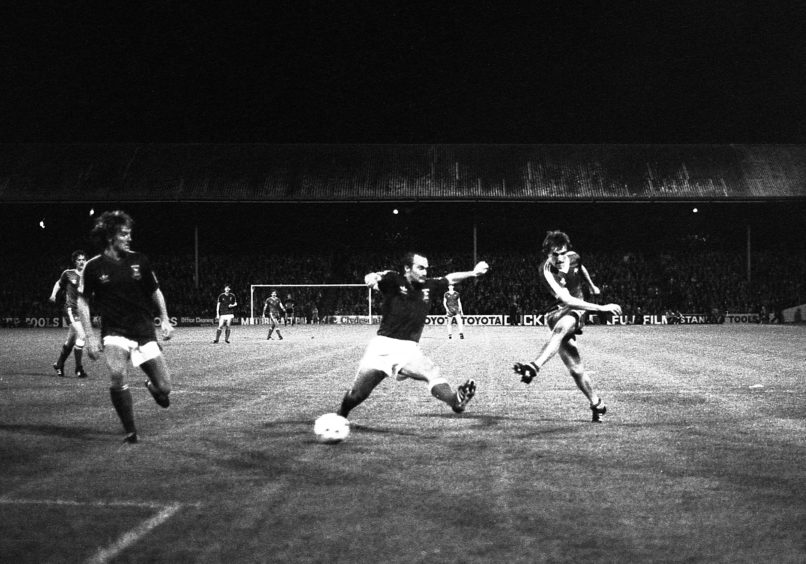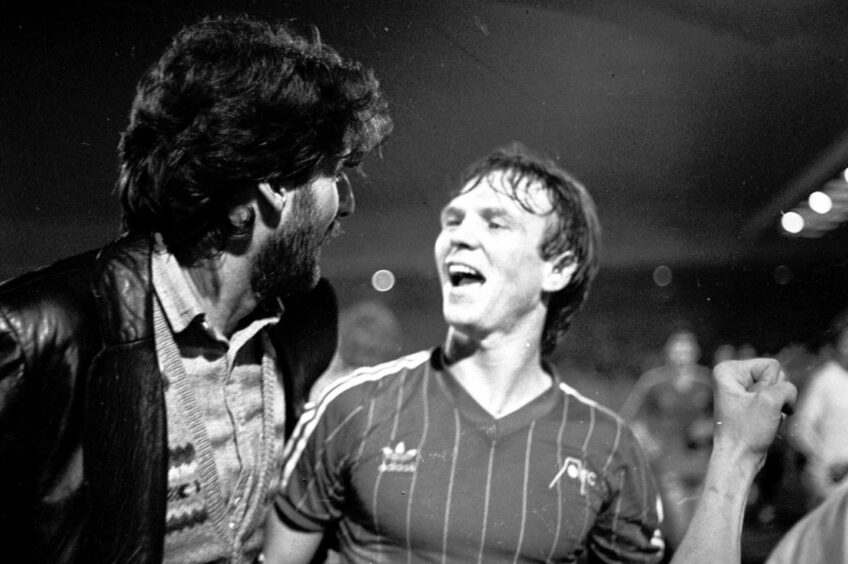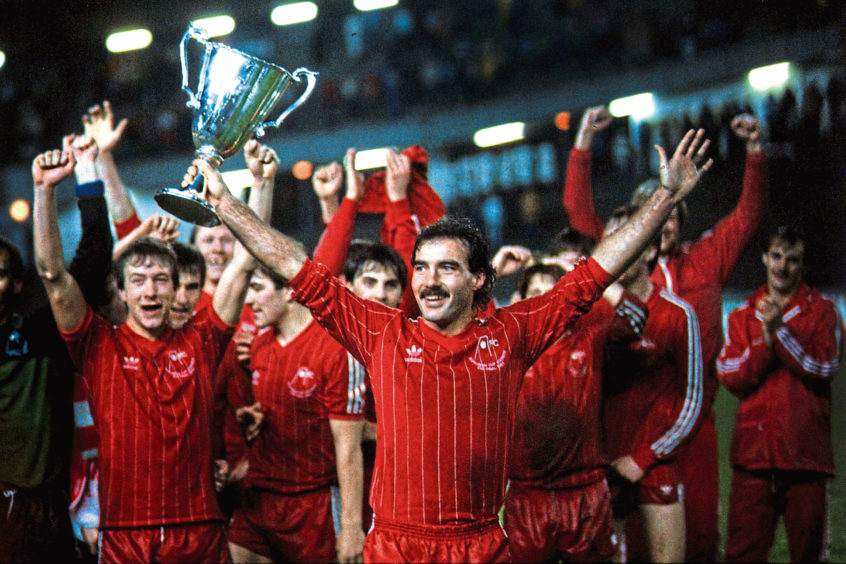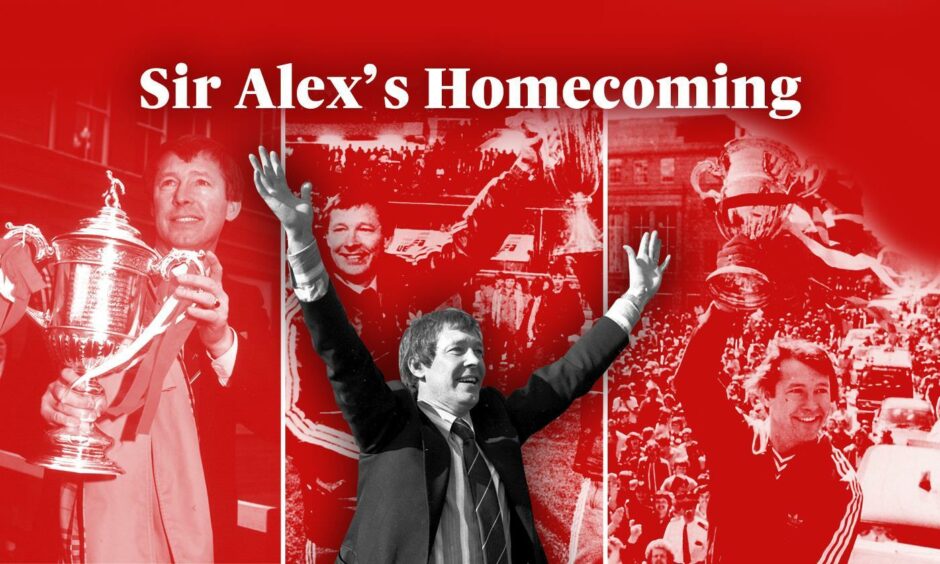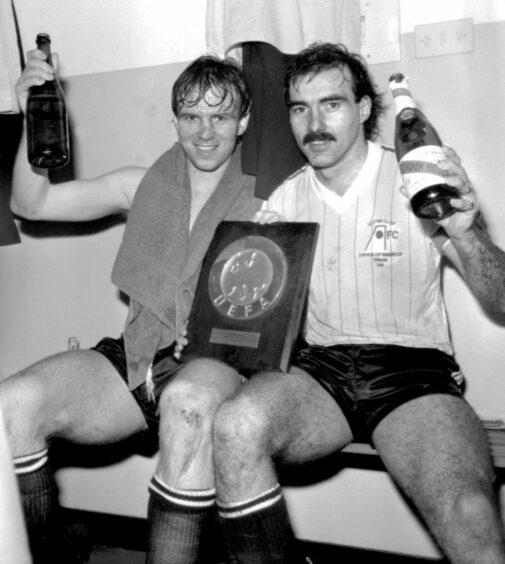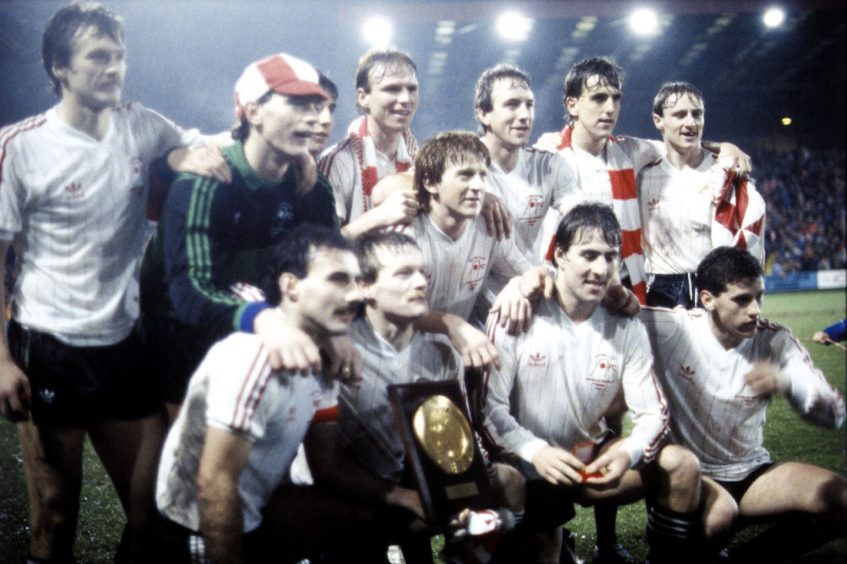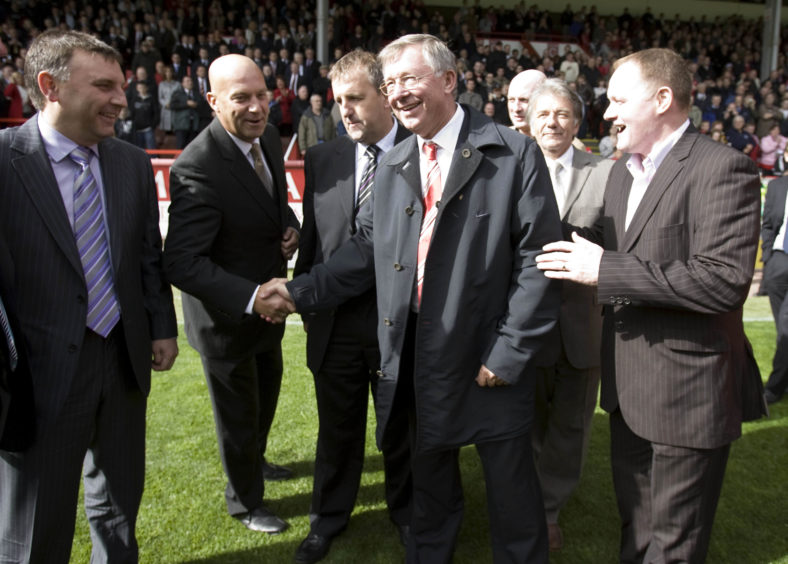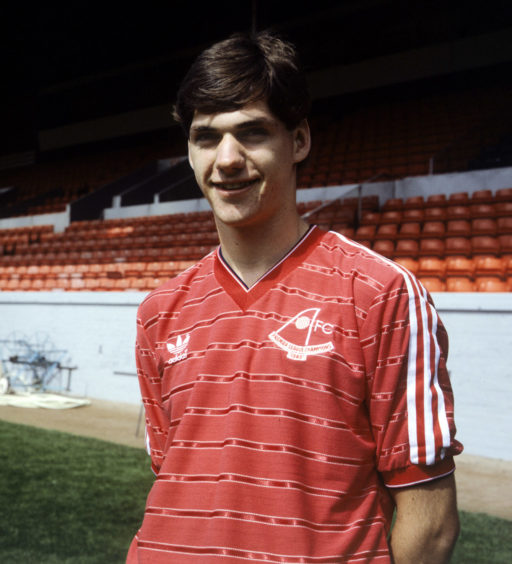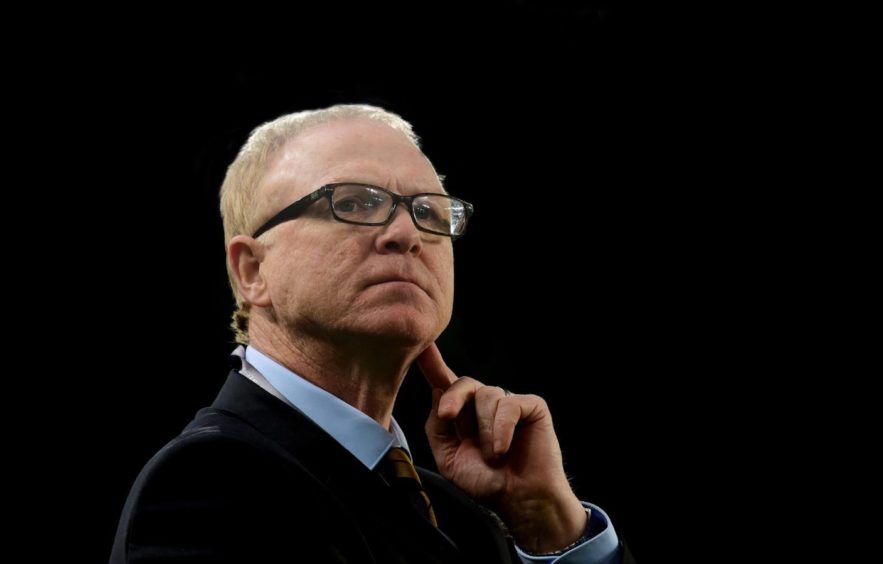As Sir Alex Ferguson prepares to return to Aberdeen for the unveiling of a statue in honour of his achievements at the Dons we will look ahead to Friday’s unveiling with former players and colleagues.
Aberdeen’s class of 1983 etched their name in the club’s history thanks to a stunning victory over Real Madrid in Gothenburg.
But Alex McLeish believes it is the toppling of Bundesliga giants Bayern Munich in the quarter-final – and with it finally overcoming the German barrier which has proved impenetrable in previous campaigns – which gave the Dons the belief they could be champions of Europe.
Sir Alex Ferguson arrived at Pittodrie in the summer of 1978 with a goal to make the Dons champions of Scotland.
It took him two years.
Turning Aberdeen into champions of Europe took five.
There were harsh lessons, and progress, on a five-year journey on the road to the fairytale ending on a rainy night on May 11, 1983.
But those pesky Germans had proved stubborn opponents for the Dons.
Fortuna Dusseldorf in 1978, Eintracht Frankfurt in 1979 and Hamburg in 1981. Three European campaigns in four years brought to an end by German clubs.
All three were hard to take for the players and their young manager but McLeish could see the progress being made.
He said: “We had faced German sides a few times and gone out but there was no doubt we were a growing team and learned a lot from those experiences.
“I can remember after a game in Germany when we’d been put out in the second leg. I’m pretty sure it was Eintracht Frankfurt in 1981 and I was the last one of the players in the dressing room.
“Sir Alex was still sitting there and I could see he had taken it badly.
“In a passing aside as I left the dressing room I remember saying to him ‘we’re getting better all the time at this boss.’
“We probably weren’t at the standard he wanted but we were getting better all the time.”
Early losses were vital building blocks in Europe
Liverpool had ended Aberdeen’s interest in the European Cup in 1980 with a 5-0 aggregate defeat. Ferguson’s Dons responded to that defeat by eliminating UEFA Cup holders Ipswich a year later in a game fondly remembered by Dons fans as the night Peter Weir ran England international Mick Mills ragged.
McLeish said: “Peter ran riot. We went to the same school in Barrhead in Renfrewshire and we played in the same school team. Even then he was something special.
“Left foot, right foot, he beat people in the style of Brian and Michael Laudrup. He was that sort of player, the way he ran at people, back in the day.”
Beating Bayern was the vital breakthrough
Hamburg would eventually stop the Dons in their tracks in the quarter-final but Aberdeen came back again in the Cup Winners’ Cup in the 1982/83 season.
In keeping with tradition under Ferguson it was the Germans who stood in Aberdeen’s way again in another quarter-final – only this time it was the biggest hurdle of all in the shape of Bayern Munich.
A goalless draw in the first leg meant all eyes were on the second leg in the Granite City.
The Germans were confident but then so too was the Dons boss and he guided his young side to a stunning 3-2 win on what is regarded as Pittodrie’s greatest night.
McLeish, who scored his side’s second goal, said: “We took a lesson from the Germans in those early years but then ironically beat the best of all the German teams in Bayern when we weren’t given a prayer.
“I went up to the lounge after the first leg in Munich and one of the Bayern players was there.
“He shook my hand and said ‘well done, but we always score away from home.’
“Sir Alex’s mantra for that particular game was just to score one goal more than them.
“The fact they scored away was accurate as we found out but we did exactly what he asked of us by scoring one more than them.
“We had to beat a very good and experienced team and it was a never give up scenario. We knew we had to keep going at them but to do what we did was sensational.”
All roads lead to Gothenburg
Eliminating Bayern gave the Dons even greater belief and they dismantled Waterschei 5-1 in the first leg of the semi-final to make the second leg in Belgium little more than a formality.
So it came to pass – Aberdeen v Real Madrid at the Ullevi Stadium in Gothenburg.
The Dons led thanks to an Eric Black goal before a McLeish pass back to Jim Leighton fell short due to the soaked pitch, and the goalkeeper fouled Santallana to concede a penalty which was converted by Juanito.
Aberdeen were not to be denied on their date with destiny, however, and John Hewitt headed home the winner in extra-time to spark scenes of jubilation at home and abroad.
McLeish said: “We had taken care of Bayern and felt we could beat anybody after that.
“When we went to Gothenburg obviously the rain was a factor and the puddles made passing on the deck pretty difficult as I found out with a passback.
“But we had immense confidence we could win the cup and it was in no small way due to beating Bayern and the drubbing of the Belgians in the semi-final.
“When you watch the game back we dominated it and it was a thoroughly deserved victory.”
Repeating European success was a monumental challenge
The Super Cup followed as the Dons became the only Scottish team to win two European trophies with victory over European champions Hamburg.
It was fitting that it should be a German side to fall to the might of Ferguson’s Dons.
Aberdeen came close to defending their title too, reaching the semi-final before losing to Porto, who then lost to Juventus in the final.
It speaks volumes of how football has changed that Aberdeen could play in the quarter-final, final and semi-final of European competition three years in a row between 1982 and 1984.
McLeish said: “I don’t look on the 1983-84 campaign as a disappointment.
“It’s so difficult to achieve two years in a row and we knew given what we had done we now had a target on our backs. Everyone wanted to beat us.
“We got to the semi-final against Porto and it was a dismal foggy night at Pittodrie if I remember right. They probably deserved to go through as we weren’t at our complete best.
“We won the Super Cup as well that season but we proved we were only human by losing the semi.
“When you have won it once you want to win it again but it is very difficult. People see you as a scalp.
“If you have the riches of Bayern or Madrid there is every chance you can do it again but for a club like Aberdeen it is a massive ask.”
McLeish has no regrets about missing out on Old Trafford move
Sir Alex Ferguson’s final European campaign in charge of the Dons ended in a first round exit from the European Cup Winners’ Cup at the hands of Swiss side Sion in October 1986.
A month later the manager was packing his bags at the end of a glorious eight-year period for a new challenge at Manchester United.
McLeish believes the writing had been on the wall for some time.
He said: “I don’t think there was any doubt we thought he would be poached by one of the biggest teams.
“He knocked back two or three as he was waiting for Manchester United and it showed you the confidence he had in himself that he could transform a team that was in the doldrums.”
Goalkeeper Jim Leighton followed his manager in making the move to Old Trafford and McLeish came close to making the trip to the north-west of England too a few years later.
Ferguson tried with all his muster to lure the central defender south but Dons chairman Dick Donald was having none of it.
The United boss was effectively priced out of the chance to reunite with his former player.
McLeish can remember the interest vividly but has no regrets.
He said: “There was a pact he wouldn’t come back for Willie or I but he took big Jim.
“I wasn’t in that pact and don’t think I was in agreement at all but the gaffer had agreed it with the directors.
“He did come back for me a few years later when a player was sold who he wanted to be kept informed about should the Dons decide to sell.
“It was Joe Miller when he went to Celtic.
“When Alex heard he told me ‘all bets are off, I’m coming for you.’
“It was the start of a few phone calls together and I think the final fee would have been around £2million for me.
“I was 29 at the time and Aberdeen said no again.
“Alex said the club wouldn’t play ball at all so he would have to sign someone else and he got some young guy called Gary Pallister instead. I think he was only 21.
“Pallister had a sticky start but became a legend.
“I don’t have any regrets at all as I think my career turned out pretty well but it one of those sliding doors moments where you wonder what might have happened.”
Ferguson influence made managers out of his players
Alex McLeish was one of several players to follow in Sir Alex Ferguson’s footsteps in pursuing a career in management after hanging up his boots.
McLeish has managed at the highest level, spending five years at Ibrox as Rangers boss as well as having the honour of managing Scotland twice.
He also worked in the Premier League in England with Birmingham City and Aston Villa while other jobs have taken him to Belgium and Egypt.
Throughout his own managerial journey McLeish believes the influence of his old Dons boss has followed him.
He said: “It was the little things he would say which I remembered after becoming a manager.
“He always encouraged us to play at a high tempo in an Aberdeen football strip.
“I always remembered those words of wisdom from him.
“Play at a certain tempo, pass assertively as if you mean it and read the game.
“When we played Rangers and Celtic he told us to run and get the ball whenever we got a throw-in or a free kick.
“He was adamant we should never slow the game down as that is what opposition teams do whenever we play Celtic or Rangers and they are used to teams wasting time.
“He believed if they saw us doing that it would unnerve them.
“All of a sudden you start winning games against them and you find yourself thinking ‘wait a minute, all these little pearls of wisdom have actually worked.’
“His influence on me and so many of the players he worked with is hard to put into words. He was a winner who demanded the best in everything. There’s no-one else like him.”
